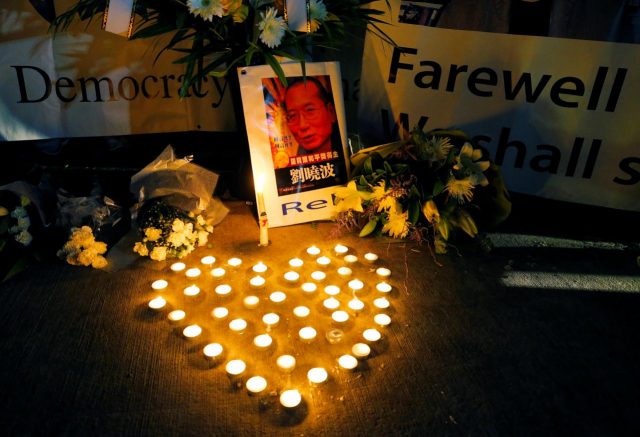
SHENYANG, China — Deceased Chinese Nobel Peace Prize-winning dissident Liu Xiaobo was cremated on Saturday and his wife is “free,” a government official said, as a state-run newspaper attacked him as a “despised” criminal out of step with Chinese society.
Liu, 61, died of multiple organ failure on Thursday in a hospital in the northeastern city of Shenyang, where he was being treated for late-stage liver cancer, having been given medical parole but not freed.
He had been jailed for 11 years in 2009 for “inciting subversion of state power” after helping to write a petition known as “Charter 08” calling for sweeping political reforms.
His wife, Liu Xia, has been under effective house arrest since her husband won the Nobel Peace Prize in 2010, but had been allowed to visit him in prison about once a month.
City government information official Zhang Qingyang said Liu Xiaobo was cremated on Saturday morning, in accordance with his relatives’ wishes and local customs.
His wife Liu Xia was present, and was given the ashes, Zhang told a news conference in Shenyang.
Zhang said, according to his understanding, “Liu Xia is free.” But he did not reveal her whereabouts.
“We want Liu Xia to avoid more trouble,” he added. “I believe the relevant departments will protect Liu Xia’s rights according to the law.”
During the past couple of weeks, Liu Xia had been at the hospital as her husband’s health deteriorated.
Rights groups and Western governments have mourned Liu Xiaobo’s death and urged authorities to grant freedom of movement to his wife and the rest of his family.
China has repeatedly attacked foreign governments for their concern about Liu and calls to allow Liu Xia to leave the country if she wishes.
Liu wanted to overthrow China’s political system and replace it with the Western model, the state-run Global Times tabloid said.
“He was paranoid, naive and arrogant,” it said in an English-language editorial on Saturday. “He had been divorced from the main theme of Chinese society and therefore became a man of the past, a political agitator and opponent.”
Liu threw himself into the lap of Western forces and Western support had become a key source of his influence, it added.
“However, his influence has breached the fundamental moral principle of Chinese patriotism and posed a challenge to China’s stability and national security. This is why Chinese society opposes and despises him.”









